While I have foundational respect for the law, I'm not that fond of lawyers: there's something grubby about interpreting rules to suit a scenario that simply isn't right. You know those instances when someone smugly proclaims "it might have been wrong – but it wasn't illegal?" Those are the times I most want to plant a trotter right in someone's smug snout — and, in Tyranny, I actually can!
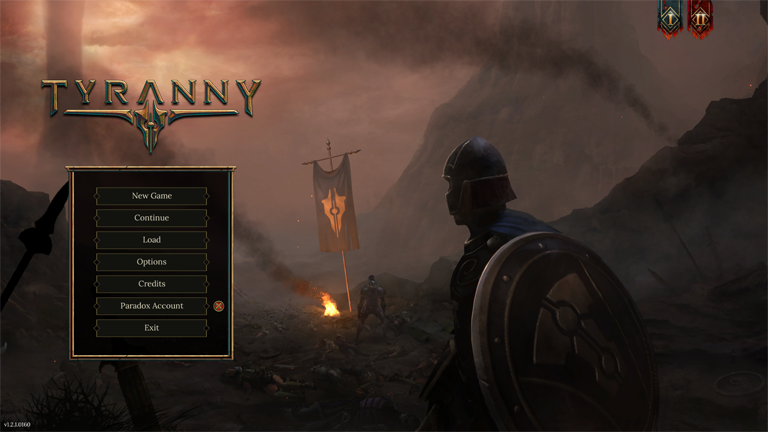
The 2016 isometric RPG from Obsidian casts you as a Fatebinder: an arbiter-at-arms working on behalf of Kyros – an evil overlord whose conquest of the known world is at one remove from being completed. Kyros' armies have steamrolled across the lands, crushing all opposition, and stand at the gates of the Tiers – the last redoubt to the overlords' conquest. The two armies sent to conquer the Tiers are not making any headway, however, so the player is sent in to "entice" them to resolve differences and complete their given task. The means of enticement? Kyros' Edict of Execution: a powerful spell that will kill everyone in the invasion corridor if a certain location is not held by Kyros' forces in seven days...
Hey: I just work here
As befits Obsidian, the world building of Tyranny is first-rate, delivering extensive backstory and lore, interesting concepts and characters and a narrative you want to partake of. The very idea of working on behalf of the bad guys is quite novel, but also so nuanced, the subhead for this review was originally going to be "Baldur's Protocol," as the ways in which you can radically alter the flow of a playthrough start at character creation and never really stop.
Instead of letting you make your Fatebinder and then plopping them into a static narrative, Tyranny starts player choice as soon as you pick your backstory and assign your stats. You are then presented with Conquest — a vignette that lets you select the decisions you made prior to your arrival in the Tiers, which aren't mere lip service.
Should you happen to, say, kill a queen in single combat or cast a devastating Edict without warning the general populace first, characters will address and act toward you in a completely different manner. It's a similar approach to the one Obsidian used in the excellent Alpha Protocol: a smaller game world, but with many moving pieces, which can alter each playthrough in a significant way depending on player decisions.
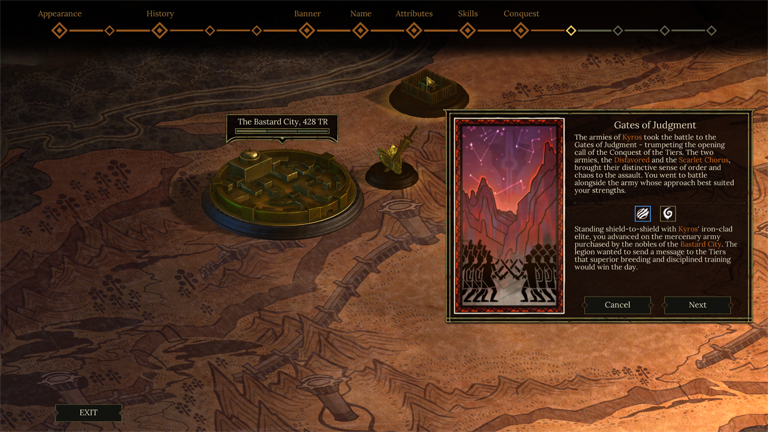
The flavor of choices you can make is also quite extensive. In Baldur's Gate 2 – which I love dearly – if you decided to roleplay evil, your latitude was generally limited to "kill them and take their stuff." But, as we are reminded on a nearly daily basis, evil comes in many shapes and forms – and Tyranny lets you adopt pretty much all of them. From being narrow-minded and cruel (the aforementioned "kill'n'loot") or Unjust for Your Own Amusement, to merely unscrupulous ("I could resolve this in your favor – for a price"); to actually being fair and kind – Tyranny offers non-binary solutions to most situations (except when it doesn't – but more on that later); and unparalleled freedom to roleplay as you see fit that you won't find in other, more traditional RPGs.
For example, in my first playthrough, of the two factions conquering the Tiers, I stuck closely to the Disfavored – honorable (if isolationist) warriors with long-standing tradition that simply felt like the lesser evil when compared to the bloodthirsty mob of the Scarlet Chorus. But the longer I played, the more I realized that – honorable or not – the Disfavored weren't really less bad: they were just Bad in a Different Way...
In most other games, said realization would have meant trudging to resigned completion or, at most, restarting the playthrough and making different choices... In Tyranny? Forty hours in, I simply switched tacks: I betrayed the Disfavored and started working to a different end.
I roll 20s
The underlying mechanics of the game are as refreshing as the characters and the deep lore. Tyranny runs on a stat-based, class-free system that lets you specify your attributes and skills, but never locks you into linear development. At any point in the game, you can start training different skills, using different weapons or even re-assign your stats for a completely different build. And while not exactly realistic ("I was a bricklayer for forty three years, until – yesterday – I became a concert violinist"), the system lends itself perfectly to playing as you want, when you want.
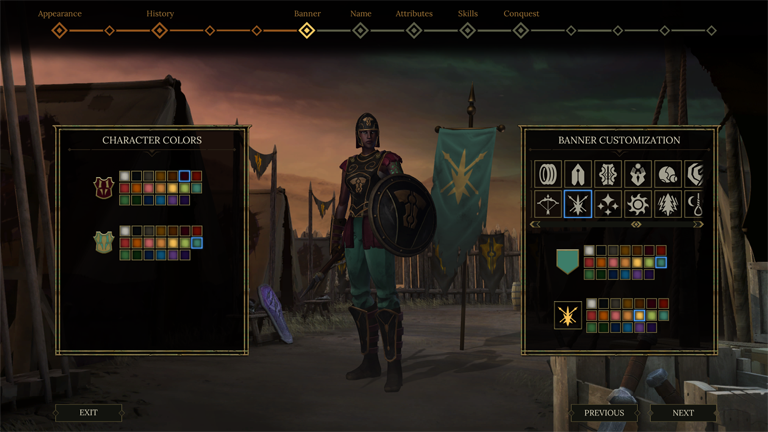
So if you start out as an ambidextrous knife wielder, but – twenty hours in – find a spear you really fancy, the game will be more than happy to let you re-adjust.
Reputation plays an important role throughout the game, with most of your actions resulting in Favor or Wrath for individuals, factions and even Artifacts you interact with. The neat thing about reputation is that it doesn't need to be favorable to prove beneficial: enough in either pool will unlock perks for your Fatebinder and if your intent is to intimidate someone, having high Wrath with them may prove beneficial.
The magic system is also worth mentioning. Unlike more traditional D&D RPGs, where you memorize pre-existing spells, Tyranny structures its castings via a handy lexicon of Sigils (signs) you can combine in accordance with your preference.
Starting with a Core, which corresponds to the type of magic the spell will be (say healing, ice, or emotion), you can then modify its Expression (how the spell will manifest — on a single target, in a cone, line or Chain Lightning-style, hopping from one target to the next); its Accent (which increases power, duration, shortens cooldown or extends range); and Enhancement (unique modifiers which can turn an ice attack into Fire and Ice, increase the amount of projectiles while narrowing the AoE or greatly raise spell potency while limiting its effects to only your party).
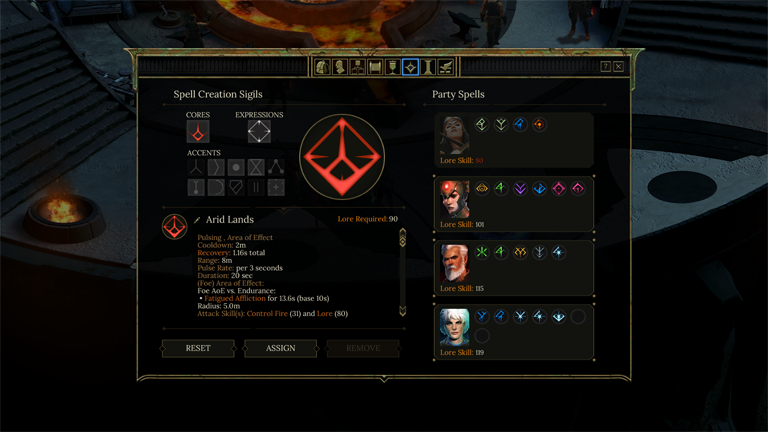
It's an inherently adaptable and, more importantly, fun approach to magic that ensures you can always have the right spell for a given situation instead of being forced to pick possibly useful options from a static list.
Not to leave any gameplay option unturned, as you progress through the game, Tyranny also unlocks research and crafting opportunities which range from extra healing items and new Sigils to crafting powerful magic equipment and even Artifacts (magic items you can gain affinity with, which further enhances their power and unlocks unique abilities).
Jagged edges
While Tyranny's achievements far outweigh its shortcomings, the latter do rear their ugly little mugs, now and again.
For starters – as with Alpha Protocol – because the plot has so many interchangeable components, the scope of the gameplay is constrained. Oh, there are enough places to go, but the environments are fairly small (no sprawling, Pillars of Eternity vistas to explore here) and what you do in them to boils down to talking or fighting. The quests are also pretty linear, so while you are always given plenty of choices, none of them are more than divergent, short paths to a result.
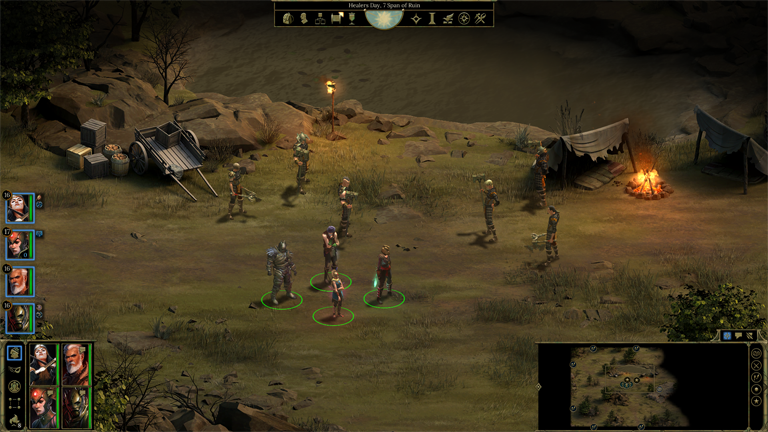
Unlike Baldur's Gate or Torment, where the prevalence of combat was softened somewhat by the vast compendium of opponents and scenarios, Tyranny has a limited palette of foes whom you fight over and over, with very little variation. It makes sense within the narrative (with the Tiers being occupied by so many factions and little else), but it makes for a repetitive experience that doesn't really introduce anything new during the course of the game. Some fights are harder than others, but each one pans out in pretty much the exact same way.
The great latitude in player choice doesn't stretch to every scenario and has the feel of a double-edged sword: when it's implemented well (as it is in most cases), you applaud it; but when it's limited to choices you don't want or, worse, absent the oversight is that much more noticeable than it would have been in a more traditional, linear game.
Lastly, as is by now canon for an Obsidian production, even years post-release, Tyranny is not without its bugs. And while they aren't major or game-breaking, in a game this polished they can be a little jarring... My most memorable to date was killing someone stone dead only to have them reappear later as if nothing had happened. Not a big deal in my playthrough (I hadn't wanted to kill them in the first place and was railroaded into it by the way my playthrough panned out), but definitely odd.
Closing arguments
Even with its jaggies, Tyranny is an entertaining and worthwhile experience that'll give you about 40-50 hours of solid roleplaying, indepth conversation, subtle maneuvering, extensive choice and – if all else fails (or you just feel like it) – hack-y, slash-y, fireball-y fun. Real-life lawyers might be a drag, but you won't ever find playing the Fatebinder dull.
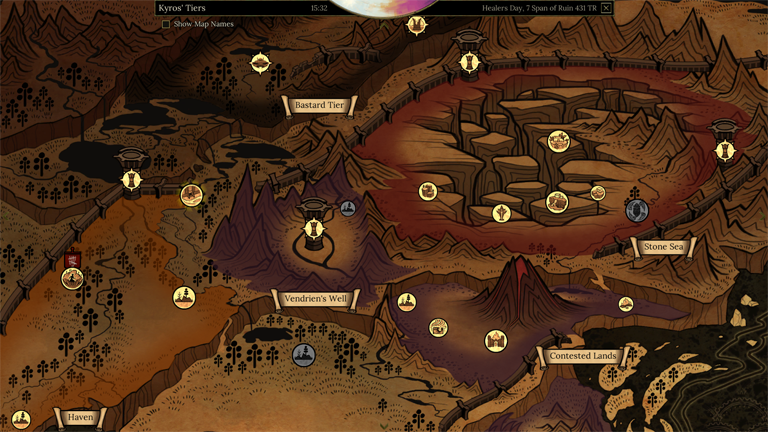
The game successfully merges Baldur's Gate or Torment gameplay with a fresh premise, dynamic choices and interesting mechanics for a result that can easily overrule whatever minor shortcomings crop up in its execution. And while the experience isn't long, by modern RPG standards, its dynamic structure encourages multiple playthroughs to see how the many different choices affect gameplay.
If you like classic RPGs with fresh ideas, wanted to play a lawyer without having to worry about strict adherence to the law, enjoy wielding worrying amounts of power with careless frivolity or wanted to try and change an oppressive system from within, Tyranny is a recommendation to which all objections are sustained.
Pig Recommends:
- -trying new things and forming your opinions from experience; for the longest time, I held off from trying Tyranny because, from reviews I've read, the game seemed like a short and limited experience where leading Kyros' conquest was the only thing you really engaged in; but – as a longtime Obsidian fan and game reviewing pig (of, admittedly, small renown) – I Should Have Known Better; no matter how extensive, no description of a thing will ever tell you what it's really like; so if you are of a mind to try something – go ahead and do it: to quote Hicks quoting Ripley "it's the only way to be sure";
